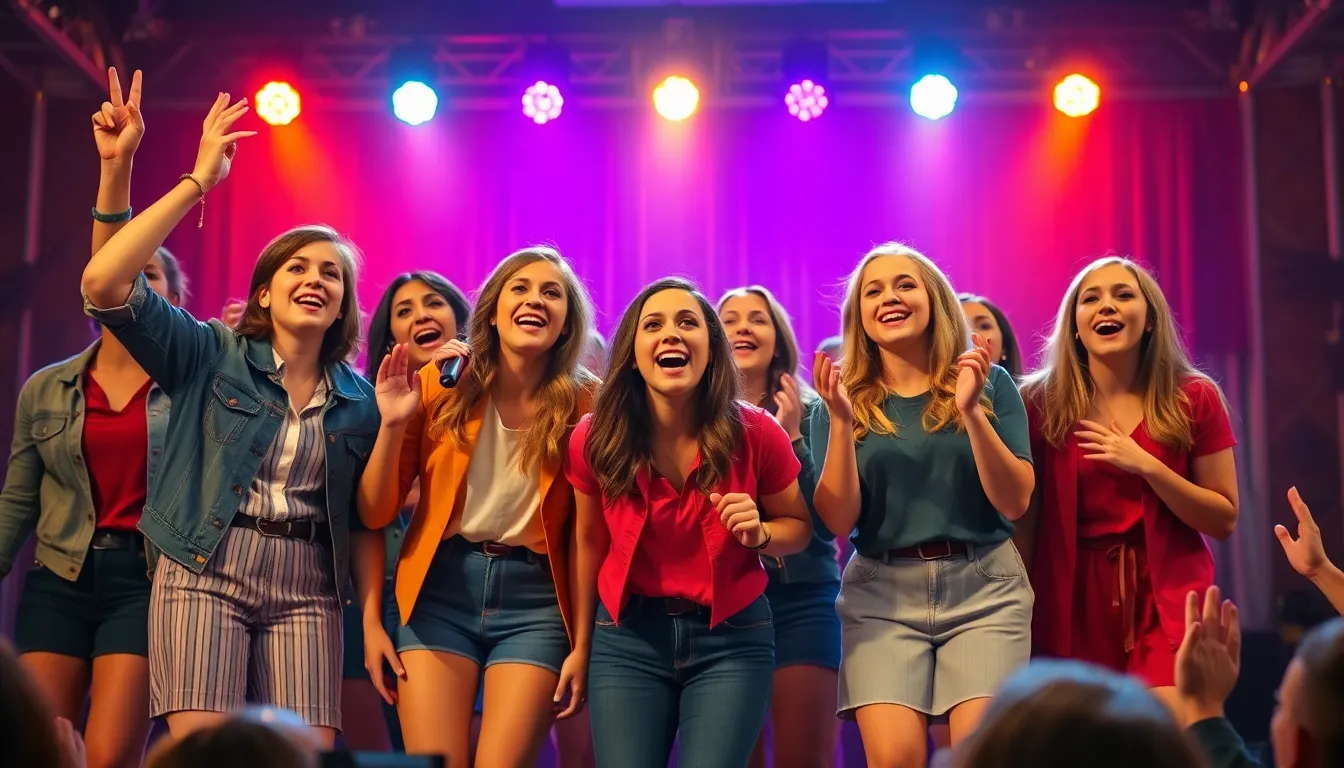Table of Contents
ToggleIf you’re ready to dive into a world where harmonies soar and acapella battles reign supreme, then the Pitch Perfect series is your ultimate ticket. These films blend catchy tunes with laugh-out-loud moments, showcasing a group of misfit singers who find their voices—and themselves—through the magic of music. Who knew belting out a few notes could lead to such epic friendships and unforgettable rivalries?
Overview of Pitch Perfect Movies
The Pitch Perfect series consists of three main films, showcasing a comedic and heartwarming journey through the world of acapella music. Each movie features a unique storyline while maintaining a strong sense of camaraderie among the characters.
Pitch Perfect, released in 2012, introduces the Barden Bellas, a female acapella group. Audiences meet Beca Mitchell, a college student determined to make her mark on the music scene. Competing against rival groups, they discover the power of teamwork and friendship, culminating in a memorable final competition.
Pitch Perfect 2, launched in 2015, takes the Bellas into their second year of competition. The plot focuses on their attempt to regain glory after a performance mishap at a presidential event. New challenges arise, and they expand their horizons by facing a talented German group called Das Sound Machine.
The series culminated with Pitch Perfect 3, released in 2017, which sees the Bellas navigating life after college. Faced with the reality of adulthood, they embark on a reunion tour that reignites their passion for performance. The film highlights the importance of bonding and rediscovering their love for music.
Overall, the Pitch Perfect movies provide an engaging mix of humor, friendship, and musical talent, appealing to fans across generations. Each installment builds on the previous one, reinforcing themes of camaraderie, personal growth, and the joy of music.
Pitch Perfect Movies in Order


The Pitch Perfect series spans three films, each contributing uniquely to the overarching narrative.
Pitch Perfect (2012)
Released in 2012, Pitch Perfect introduces audiences to the Barden Bellas. Beca Mitchell leads the group, aiming to redefine their sound and shine in the acapella world. The film expertly balances humor and musical performances, showcasing a journey of self-discovery and teamwork. Rivalries emerge, notably with the Treblemakers, adding competition and excitement. A compelling climax features the Bellas battling in the ICCA finals, underscoring their growth and collaboration.
Pitch Perfect 2 (2015)
The sequel, Pitch Perfect 2, arrived in 2015 and escalated the stakes for the Barden Bellas. An embarrassing performance at a presidential event sets the group on a quest to reclaim their status. New rivalries, including their formidable foes, Das Sound Machine, introduce fresh challenges. Music and comedy blend seamlessly throughout the film, as the Bellas strive for redemption and unity. A thrilling finale at the World Championships showcases their resilience and musical talent.
Pitch Perfect 3 (2017)
In 2017, Pitch Perfect 3 concludes the trilogy with the Bellas facing life after college. Reunited for one last time, the group embarks on a tour that reignites their passion for performance. Challenges arise as they balance personal aspirations and their music legacy. The film combines humor, nostalgia, and new experiences, highlighting the importance of friendship. A climactic performance rings in their journey, emphasizing themes of support and growth within the acapella world.
Key Themes and Elements
The Pitch Perfect series showcases distinct themes that resonate throughout its films, emphasizing camaraderie and personal growth.
A Cappella Music
A cappella music serves as the backbone of the Pitch Perfect series. Performances feature vocal harmonies and mimicry of instruments, creating a unique sound landscape. Each film highlights the technical aspects of a cappella, inspiring audiences and showcasing the talent of the performers. The characters face challenges that push their musical abilities, ultimately leading to memorable competitions. These contests not only display their vocal skills but also illustrate the effort behind perfecting each performance. The blend of diverse musical genres further enhances the experience, drawing in fans with varying musical tastes.
Comedy and Character Dynamics
Comedy thrives within the Pitch Perfect films through dynamic character interactions. Characters develop through humorous exchanges and relatable situations, creating a strong connection with the audience from the outset. The portrayal of rivalry adds layers to the comedic elements, often highlighting the absurdity of competitive settings. Each character contributes to the group’s chemistry, with unique personalities that contrast yet complement one another. Friendships evolve through laughter, emphasizing the importance of support in facing challenges. Emotional moments balance the comedy, enriching the narrative and emphasizing growth in both personal and musical endeavors.
Impact and Reception
The Pitch Perfect series enjoyed significant cultural impact and box office success, resonating with audiences worldwide.
Box Office Success
The franchise generated impressive box office figures, with the first film grossing approximately $115 million against a mere $17 million budget. Pitch Perfect 2 increased its earnings, raking in about $287 million globally, an indication of its growing popularity. The final installment, Pitch Perfect 3, brought in around $184 million, solidifying the series as a commercial success. Audiences flocked to theaters, drawn by engaging storytelling and lively music. Each film’s unique blend of humor and talent contributed to its financial triumph, appealing to fans of all ages.
Critical Reviews
Critics offered mixed reviews throughout the series, praising the performances and catchy musical numbers while occasionally questioning the plot’s depth. The first film earned a 79% rating on Rotten Tomatoes, with reviewers commending its fresh take on the musical genre. Pitch Perfect 2 received a 65% rating, with some critics highlighting its humor but noting repetitive elements. The final film scored lower, around 37%, with critiques focusing on story execution. Despite varied reviews, the series maintained a dedicated fanbase, celebrating its memorable characters and infectious energy, ultimately solidifying its place in pop culture.
The Pitch Perfect series has left an indelible mark on audiences with its unique blend of music and humor. Each film not only showcases impressive vocal performances but also highlights the importance of friendship and personal growth. As fans revisit the journey of the Barden Bellas they celebrate the laughter and challenges that come with pursuing their passion for acapella.
With its cultural impact and commercial success the series resonates with viewers of all ages. The memorable characters and their evolving relationships continue to inspire and entertain. The legacy of Pitch Perfect will undoubtedly endure as a beloved part of pop culture.




